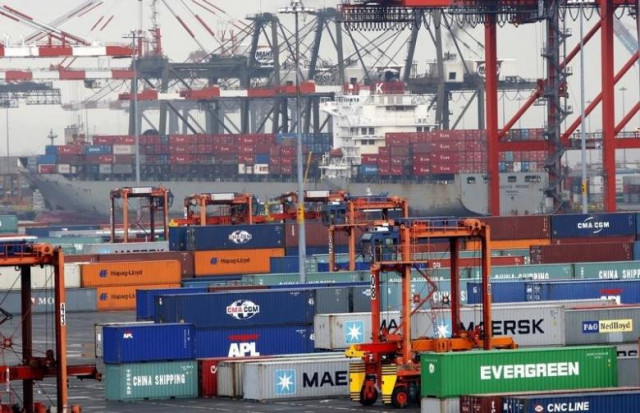Trade wars - are they good and easy to win?
There could be an opportunity for Pakistan to increase its market share

Shipping containers are seen at a port. PHOTO: REUTERS
When some exporting countries such as China, Canada and Turkey reacted by imposing tit-for-tat tariffs, the US president further fueled the fire by imposing more tariffs on those countries.
Now Canada and the US have $16.6 billion of tariffs on each other’s goods. Similarly, the US counter-reacted to Turkey’s tariffs and doubled its import duty on imports of steel and aluminium from Turkey, thereby almost shutting out Turkish exports of these products.
But the biggest tariff battles are being fought between the US and China. The US government has already imposed tariffs on $250 billion worth of Chinese imports. China has responded with counter-measures including tariffs on $110 billion of imports from the US.
It has been six months since the tariff war started. It is not enough time to make a final appraisal but early signs are that the trade war has started hurting economies of several countries and US producers are amongst the major losers.
In particular, the US farmers have already started losing their export markets. For example, soybeans are the largest US agricultural export and China is the bigger buyer.
After China retaliated by imposing tariffs, US exports of soybeans fell by $700 million in July 2018, a 16% drop from the previous month. To make up for losses of the US farmers, Trump announced subsidies of $12 billion, which many farmers say is not enough.
Manufacturing is faring no better. According to various surveys conducted by US manufacturers, it is not just the cost of raw material and components which has been increasing but also there are long delays for supplies reaching factory production lines.
Most exporters fear that a prolonged trade war would result in cost increases and thus reduce their competitiveness.
Many commentators are of the view that the world’s two largest economies are now entering the opening stages of a new economic Cold War, one that could persist for some time to come.
The current US tariffs are an aberration of its trade policies, which it has been following since the 1930s, when steep tariffs had resulted in global trade slowdown and the Great Depression.
Learning from the disastrous impact of those tariffs, the US has always been one of the biggest champions of free trade and open markets. While it has occasionally resorted to trade measures under WTO rules, this is the first time it is using national security provision since the establishment of the World Trade Organisation in 1995.
According to Nobel laureate Paul Krugman, “Trumpian trade policy has, almost casually, torn up rules America itself created more than 80 years ago — rules intended to ensure that tariffs reflected national priorities, not the power of special interests … and this will have nasty consequences”.
Some studies such as by Unctad suggest that if the trade war continues, average tariffs could rise from negligible levels to as high as 30-40% for major exporting countries. Even for developing countries that played no role in starting the conflict, the tariffs could rise from 3% to 37%.
Impact on Pakistan
How can Pakistan be impacted by the tariff war? The US is Pakistan’s largest export market and one of the very few with which it enjoys a substantial trade surplus, with exports of $3.5 billion against imports of $2 billion.
This week’s US tariffs of $200 billion on China cover several consumer goods including textile and clothing articles (but exclude bed linen and towels). The tariffs would raise prices of Chinese goods and thus could be an opportunity for countries like Pakistan to increase their market share.
Another impact of the tariff war has been the recent planning and speeding up of shifting of labour-intensive industries to lower-cost Southeast Asia. Most of the relocation is currently being planned to countries such as Vietnam, Bangladesh, the Philippines and India.
Pakistan is in the process of setting up Special Economic Zones under the CPEC initiative but there seems to be no signs of relocation of these industries here.
With the abatement of the energy crisis and improved law and order situation, Pakistan should not let go of this opportunity. Unfortunately, our short-sighted protectionist policies are not helping the situation as some of our influential business interests are making every effort to avoid any competition.
The writer served as Pakistan’s ambassador to the WTO from 2002 to 2008
Published in The Express Tribune, September 24th, 2018.
Like Business on Facebook, follow @TribuneBiz on Twitter to stay informed and join in the conversation.



















COMMENTS
Comments are moderated and generally will be posted if they are on-topic and not abusive.
For more information, please see our Comments FAQ